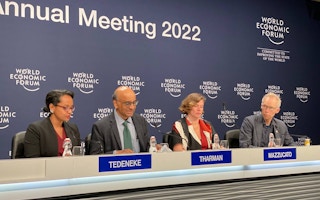The global population relies on water for its survival, yet the conversation on how water resources are managed and governed is missing from the global policy stage, said experts at the World Economic Forum Annual Meeting on Wednesday.
To address this gap, a new Global Commission on the Economics of Water has been launched to provide evidence and make recommendations for changes in policy and business approaches to this precious resource.
Speaking in Davos, Switzerland, Professor John Rockström of the Potsdam Institute for Climate Impact Research — one of four co-chairs of the global commission — noted that “water is the first casualty of the climate crisis”.
Water stress driven by climate change and ecosystem degradation is threatening human wellbeing, the global economy and the resilience of societies in the face of rising shocks, he said.
“Extreme floods, droughts and water stress are already affecting billions of people…The consequences of our collective neglect and poor governance of our water resources will most impact poor people all over the world who will suffer from inequity of access and ensuing water-related conflicts,” he added.
The Commission, a two-year initiative, is an independent body convened by the Government of the Netherlands and facilitated by the Organisation for Economic Co-operation and Development (OECD).
The three other co-chairs are Singapore’s senior minister and coordinating minister for social policies Tharman Shanmugaratnam; Professor Mariana Mazzucato, the founding director of the University College London (UCL) Institute for Innovation and Public Purpose; and World Trade Organisation director-general Ngozi Okonjo-Iweala.
“Given the gravity of the issue, it is very unfortunate that [water] has not received the attention it has deserved,” said Tharman at a briefing.
The commission will not be “just another report”, he added, but is aimed at mobilising action, as well as lead to changes in government and finance. It will enable the scaling up of technologies and solutions that can allow everyone in every corner of the world to have access to clean drinking water and safe sanitation, he said.
When tackling water issues, the global community needs to go beyond thinking about “delivering aid”. “This is about investing in the global commons… we need to invest effectively to solve this problem…and engage the private sector too,” said Tharman, noting that about US$300 billion will need to be raised each year to be deployed in low- and middle-income countries.
The co-chairs said the Commission will publish its first report at the United Nations 2023 Water Conference — the first global conference on water in 46 years – to be held in New York and co-hosted by Tajikistan and the Netherlands in March. The group also comprises 17 experts, community leaders and practitioners across science and policy from around the globe.
Responding to a question on what success looks like for the Commission, Rockström told Eco-Business: “It’s too early to start listing the results of the commission… We foresee a new paradigm of water as a common good, governed and managed as such… to reconnect to the hydrological cycle.”
The commission will also “put a price on water to guide and incentivise… but not to punish those who are poor, but reward those who are stewards of fresh water of the common good,” he added. The commission will be investigating current governance models and is considering pushing for a global price for freshwater.
Drawing on Singapore’s experience in managing water, Tharman noted that the city-state’s vulnerability in water had spurred innovation and the right governance since its early years of independence. In the same way, the same urgency will guide the Commission’s recommendations. Water is a “whole of government and whole of society responsibility”, he said.
UCL’s Professor Mazzucato added that it is important that any solutions will have to be equitable and inclusive, and successful pilots need to be scaled. “We are not using fluffy language… we are talking about changes to business models, providing concrete evidence and thought leadership,” she said.

















